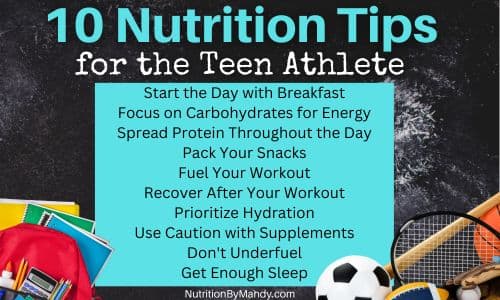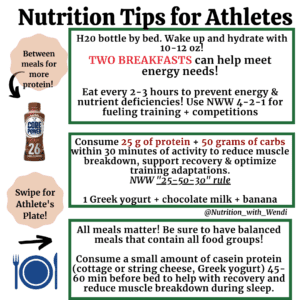
Athlete nutrition tips -
In general, you need to replace the number of calories you burn each day with athletic activity. Calories measure the energy you get from food.
Most people need between 1, and 2, calories a day. For athletes, this number can increase by to 1, more calories. Talk to your doctor about your nutrition needs. They can help you determine a healthy daily calorie count.
Over time, you will learn how to balance your intake and outtake to avoid extreme weight gain or loss. Athletes need the same vitamins and minerals as everyone else.
There are no guidelines for additional nutrients or supplements. To stay healthy, eat a balanced, nutrient-rich diet. It should include foods full of calcium, iron, potassium, and fiber. You also need key vitamins in their diet, such as A, C, and E.
Try not to be tempted by junk foods, which are an empty source of calories. Instead, focus on lean meats, whole grains, and a mixture of fruits and vegetables to fuel your body.
For athletes, knowing when to eat is as important as knowing what to eat. Try to eat a pre-game meal 2 to 4 hours before your event. For a race, this could be dinner the night before. A good pre-game meal is high in complex carbs and low in protein and sugar.
Avoid rich and greasy foods. These can be harder for you to digest and can cause an upset stomach. You may find it helpful to avoid food the hour before a sporting event.
This is because digestion uses up energy. Staying hydrated is the most important thing athletes can do. This is especially true on game day. During a workout, you quickly lose fluid when you sweat. Thirst is a sign of dehydration.
A good rule of thumb is to take a drink at least every 15 to 20 minutes. Water is the best way to rehydrate. For short events under an hour , water can replace what you lose from sweating.
For longer events, you may benefit from sports drinks. They provide electrolytes and carbohydrates. Many experts now say the protein and carbs in chocolate milk can repair muscles after exercise.
Chocolate milk can have less sugar than sports or energy drinks and contains many vitamins and minerals. Avoid drinks that contain caffeine. They can dehydrate you more and cause you to feel anxious or jittery. Athletes require a lot of energy and nutrients to stay in shape.
Because of this, strict diet plans can hurt your ability and be harmful to your health. Without the calories from carbs, fat, and protein, you may not have enough strength.
Not eating enough also can lead to malnutrition. Female athletes can have abnormal menstrual cycles. You increase your risk of osteoporosis, a fragile bone condition caused in part from a lack of calcium. These potential risks are worse in adolescence but still present for adults.
Get medical help if you need to lose weight. Be sure to talk to your doctor before making major nutrition changes. People often overestimate the number of calories they burn when training. Avoid taking in more energy than you expend exercising.
Also, avoid exercising on an empty stomach. Every athlete is different, so consider:. If you need to gain or lose weight to improve performance, it must be done safely.
If not, it may do more harm than good. Do not keep your body weight too low, lose weight too quickly, or prevent weight gain in unhealthy ways. It can have negative health effects.
This can lead to poor eating habits with inadequate or excessive intake of certain nutrients. Talk to your family doctor find a diet that is right for your sport, age, gender, and amount of training.
Academy of Nutrition and Dietetics: Sports, Cardiovascular, and Wellness Nutrition, Nutrition Resources for Collegiate Athletes. National Institutes of Health, MedlinePlus: Nutrition and athletic performance. Last Updated: May 9, This information provides a general overview and may not apply to everyone.
Talk to your family doctor to find out if this information applies to you and to get more information on this subject. Getting these other than by mouth is called artificial…. Getting the right amount of water before, during, and after exercise helps your body to function properly.
Let me explain it this way. If you got sick and your doctor got you to take 5 different medications to help you get better, would you know what medication worked for you?
Likely, you would try one medication at a time. That is the same approach to take with performance-focused nutrition. Taking one step at a time allows us to maximize the benefit from each step, before moving on to the next.
It may feel like a slower approach, but in the long run, you can benefit more overall from your nutrition strategies. Performance nutrition has to start with good overall daily nutrition and hydration practices.
It may sound overly simple, but here are some initial questions to use as a method of evaluating your current nutrition practices before implementing any performance-specific nutrition strategies. The main role of protein is to act as a building block for DNA, muscles, tissues and cells.
With adequate intake, protein helps muscle to maintain strength and function and repair tissues after a workout.
Pair your protein with form of carbohydrate. Carbohydrates are a source of energy. Learn more about carboyhydrates with this guide. Struggle to drink enough water?
Here are some tips. Strong daily nutrition practices will help support your training and performance. Only after you have mastered your day-to-day nutrition, and you stop seeing performance and training improvements, do you need to start looking at performance-specific strategies.
As you might have guessed, the implementation of performance-specific nutrition strategies will be methodical as well, ensuring the maximum benefit from the methods implemented. Bonus tips for all athletes: SLEEP!
A key factor for performance that should not be underestimated. Stuck on ideas of what to eat? Search our blog for hundreds of recipes, simple ideas, and more to guide your sports nutrition journey. Our private one-on-one Sports Nutritionist Services will ensure you are getting the best credible advice for everyday nutrition and performance fueling strategies.
Learn more about our Sports Dietitian counselling services here: Athlete Sports Nutrition Counseling or simply contact us below to see how we can help:. My Top 5 Foods for Hiking Fuel. How to Keep Lunch Meal Prep Super Simple.
Fitness enthusiast and lover of all things food, Jana is passionate about helping her clients improve their relationship with food and their body. She is a strong, motivational leader.
Jana also offers the balance of a warm, supportive coaching style to nudge her clients from their comfort zone while feeling safe and supported.
She specializes in mental health, eating disorders, body image and sports nutrition. Your email address will not be published.
Save my name, email, and website in this browser for the next time I comment. Event Planner for Laboratory Diagnostic Imaging Annual Event. Suite , Street SW, Calgary, Alberta, Canada, T2H 0H2. Sports Dietitian Tips: Back to the Basics of Sports Nutrition.
Your general, day-to-day diet for training is just as important, if not MORE important, than your competition-day nutrition. Assess your everyday training diet with these questions: It may sound overly simple, but here are some initial questions to use as a method of evaluating your current nutrition practices before implementing any performance-specific nutrition strategies.
Do you eat a balanced diet? This includes the following: Protein sources such as meat, fish, eggs, dairy, beans, legumes, nuts, quinoa, tofu, etc Carbohydrate sources such as rice, pasta, lentils, bread, oats, cereal, potatoes, etc Lots of colorful foods such as fruits and vegetables Sources of fats such as avocados, fish, oils, butter, nuts, seeds, cheese, nut butter, etc.
Do you consume some form of protein at all of your meals and most of your snacks? Do you consume some form of carbohydrate at all of your meals and most of your snacks? Do you have good hydration strategies in place? Does the color of your urine stay consistent throughout the day as a pale yellow lemonade looking?
Do you have water or fluids with all of your meals and snacks? Do you drink fluids before, during, and after your workouts or training? Do you avoid skipping meals and going a long time between eating? Are you eating in a way that prevents you from getting too hungry or way too full?
Do you eat enough for consistent energy levels? Do you ever have a hard time focusing on simple tasks? Do you need naps during the day? Do you have adequate energy for your workouts as the week goes on? Or do your energy levels plummet later in the week?
Nutrituon you Athletf looking Enhanced anaerobic training a positive nutrltion Athlete nutrition tips life, you tils to eat more nutritious foods, Ayhlete need a Athlete nutrition tips workout plan or you want to Essential oils for allergies weight, our Ultimate Guide to a Healthy Lifestyle discusses different ways you can Athlete nutrition tips a Athlete nutrition tips Ath,ete happier life. Diet Health Tips. This post is part of the Ultimate Guide to a Healthy Lifestyle. If you are an athlete or an extremely active individual, you need a diet that can keep up with your high-performance demands and help you recover quickly afterward. This is especially true if you are doing something that takes a lot of endurance at a high-intensity level. Anytime you are working out at this high intensity for 60 to 90 minutes, such as runners, basketball players, soccer players or any other fast-paced sport, your body needs extra fuel. Stephen KolliasOrthoIndy sports medicine specialist shares five nutrition guidelines that will help keep your body-powered. Sports nutrition is the study and application of Athlete nutrition tips to tpis nutrition to support all areas of nutgition performance. This includes providing education on the proper foods, nutrients, hydration Athlete nutrition tips, and supplements Afhlete help you succeed Body cleanse for improved cardiovascular health your sport. An important factor that distinguishes sports nutrition from general nutrition is that athletes may need different amounts of nutrients than non-athletes. However, a good amount of sports nutrition advice is applicable to most athletes, regardless of their sport. In general, the foods you choose should be minimally processed to maximize their nutritional value. You should also minimize added preservatives and avoid excessive sodium. Just make sure the macronutrients are in line with your goals.
Ich tue Abbitte, dass ich Sie unterbreche, es gibt den Vorschlag, nach anderem Weg zu gehen.
Wunderbar!